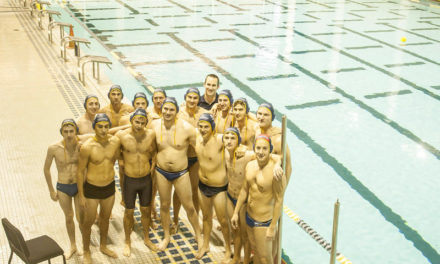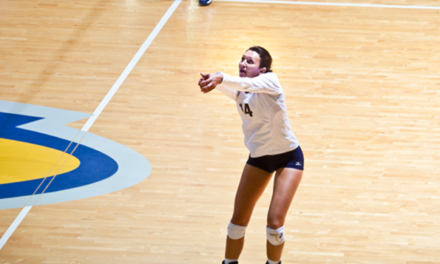
Emory University and Virginia Tech compete for the ball in the fourth chucker of the Oct. 27 contest. Virginia Tech secured a 10-3 victory at the Atlanta Regional Polo Center in Tyrone, Ga. Monica Lefton/Staff
At the end of a long, dirt road flanked by a forest of trees and farms, the Emory University Polo Club competed at the Atlanta Regional Polo Center (ARPC) in Tyrone, Ga., Oct. 27 with hopes of a regional birth. Riding under the radar is the norm for Emory’s polo club, which celebrates its 10th year at Emory this season. The 14-member team may not be among the elite teams of club polo just yet, but Emory’s polo culture grows as the team attracts more talent and reaches for the sport’s next level.
The Oct. 27 match against Virginia Tech (VT) was the team’s second of the season and counted as one of two games required to enter the preliminary tournament for the U.S. Polo Association (USPA) Intercollegiate Southeastern Regionals. Score sheets for each match are sent to the USPA and, regardless of the outcomes, playing in the two matches has qualified the team for Regionals. Emory currently holds a 0-2 record.
Emory’s polo team practices at the ARPC. Emory clubs are not allowed to own any livestock, according to Emory’s Club Sports Council Handbook, so each member of the polo team pays a fee, between $475 and $575, to rent time, space and horses at the center.
The sand-floored arena at the ARPC is a wide oval with two tall, black walls on either end, marking the goals. The area is mostly forest, apart from a small seating section and gravel lot, which is often filled with cars and horse trailers.
Owned by Emory alumna Jolie Liston (90C), ARPC opened in 2006. Emory polo didn’t exist when Liston was a student, but through her father’s horse farm, she came to learn and love the sport. After she opened the center, Liston reached out to the Emory community to see if there were any polo programs at Emory that needed support, knowing the University already had an equestrian team. Emory’s polo club team was founded in 2007, and Liston began working with them a few years later.
“They start with knowing nothing to excelling,” Liston said. “Some of the Emory graduates have gone on to polo elsewhere, and I’m excited for them because it’s an awesome sport for people who are competitive and who love horses. I really like to watch them progress.”
The team’s 14 members include three varsity, three junior varsity and eight beginner players. All eight beginner players are new to the club this year. Most players have little, if any, experience with horseback riding or polo before joining the team, according to Club President Monica Schweizer (18C).
The team practices twice a week, Tuesdays and Fridays. Practices are a full evening commitment usually taking at least 5 hours, due to commuting to and from ARPC, caring for the horses and actually practicing polo.
Head Coach Frankie Questel, whose father was a professional polo player in San Diego, has played polo most of his life. He played polo in California, Minnesota and Florida before settling in Georgia. He has worked at ARPC and coached Emory’s polo team for almost four years.
This year, Questel is excited about the players’ dedication, the new additions and returning members.
“This group of players, beside last year, is probably one of the best it has [been] in a long time,” Questel said. “Their attitudes are 100 percent right.”
Although several of VT players playing on Friday have more experience, Emory didn’t hold back. Within the first two minutes of the game, junior Rebecca Leussing shot and scored. VT scored twice more before Schweizer completed a shot in the final 30 seconds of the first chukker (that’s polo-talk for “quarter”).
Between each chukker, horses are swapped out to give them time to rest. Twelve horses were tacked (dressed in full gear) for Friday’s match, with each horse playing two, non-consecutive chukkers. Teams also swap horses each chukker to make sure no team has an advantage with a single horse.
By halftime, Emory and VT were tied 3-3. Junior Kimberly Eckles scored Emory’s third goal in the second chukker. However, a tough second half left Emory trailing the rest of the match. Several straight runs to goal as well as a “pony goal” (when a horse accidentally hits the ball in with its feet) pushed VT ahead to a 10-3 victory.
Schweizer said that she was satisfied with the team’s performance despite the loss but hopes their ability to communicate and work together in the arena improves.
“I think we did pretty well for us, but I think the one thing that we kind of struggle with is playing as a team,” Schweizer said. “In theory we have most of the ideas and everything down. [The problem is] just in execution. It’s missing a little bit.”
Despite the score, VT and Emory are often at similar levels of play. In the 2017 preliminaries, Emory took the second spot over VT and behind University of Kentucky (UK). UK advanced to play University of Virginia.
Questel hopes the team can slide through to playing in regionals this year, because they came within one point of it last year.
“I’d really like these girls to win the prelims, at least, because we came really close last year,” he said. “I’d really like them to get to that level again, and I think we’ve got a little bit of a shot here.”
Schweizer agreed, noting progress between the scores in their two VT games, from 6-16 on Oct. 20, to 3-10 on Oct. 27.
“Just within the week we’ve improved a lot,” Schweizer said. “With time and more practicing together we’ll be at a good place. We are similarly matched to Virginia Tech and other teams in our region, but we just have to be more cohesive.”
The team has no more varsity matches scheduled for the season. They will play at VT against the VT junior varsity team Nov. 11. A date for regionals has not been released, but preliminary rounds often begin mid-March.







